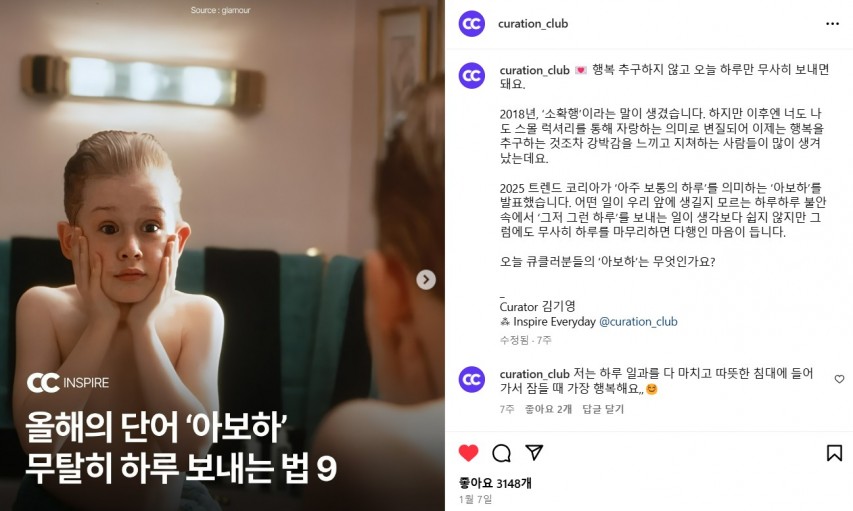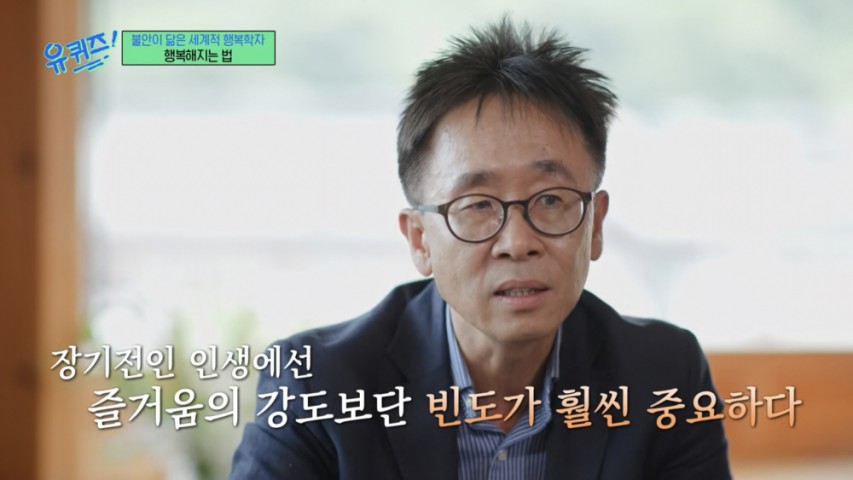[Feature] The Aboha Trend: Redefining Happiness in Modern Life
The Aboha trend has
recently emerged. According to Trends Korea 2025, released by the Korea Economy Business Institute, Aboha represents a lifestyle centered on finding happiness in everyday
life rather than special achievements or extravagant experiences. Data from the
BlackKiwi keyword search volume tracking system indicates that Aboha first appeared on September 25 last year, with 23,300 monthly
searches and 6,370 content publications recorded in January. In the past, the Korean
phrase sohwakhaeng,
meaning small but certain happiness, was a popular concept associated with happiness.
However, it turned into a culture
of flaunting happiness on social media. Now, individuals who are exhausted by this pressure are trying to shift their focus to
finding happiness in their ordinary lives instead.
Background of Aboha Life Tren
The Aboha trend reflects a society losing its vitality, where young people find it increasingly difficult to envision an optimistic future. Kim Ran-do, a professor of Dept. of Consumer Science at Seoul National University, said, “Many economic experts are predicting that the current stagnant economy will continue next year.” at a press conference for the release of Trend Korea 2025 at the Korea Press Center on September 25, 2024. “When the economy is sluggish, small and sensitive things become important, and we become more present-oriented,” he explained. According to Reuters, the Bank of Korea lowered its economic growth forecast for 2025 to 1.6-1.7% from 1.9%. In addition, the consumer price index rose 1.9% year-on-year in December 2024, higher than the previous month's 1.5% increase, and the won weakened 5.2% against the U.S. dollar in December 2024. The Korea Chamber of Commerce and Industry analyzed that the market is expected to grow only 0.4% this year due to changes in the U.S. trade policy and heightened uncertainty in domestic politics.
The mindset of appreciating the value of a peaceful day resonates with many Koreans, who have been dealing with an unstable domestic situation since martial law, an economic downturn, and the Jeju Air crash. Choi Hye-won, a professor of Dept. of Sociology at Kyung Hee University, explains the connection between the current social situation in Korea and the Aboha lifestyle trend: “When society is unstable, it can be difficult for individuals to make challenging and risk-taking choices. As the external sphere becomes uncontrollable, there is a tendency to Pursue happiness and a comfortable life in the personal sphere that one can controlled.”
Prof. Kim Ran-do
Photo: Yonhap News(yna.co.kr)
Example Activities of Aboha Life Trend
This Aboha life trend has implications for individual consumption patterns. Consumers are no longer obsessed with ostentatious purchases but are shifting towards inner satisfaction and practicality. Instead of spending money on expensive items for special occasions, products that can bring small satisfactions to everyday life are gaining more attention. For example, premium toothpastes such as Marvis and Euthymol have become a private pleasure that provides small daily contentment. According to Olive Young, toothpaste category sales grew 45% year-on-year in 2023. Furthermore, luxury towels, high-end comforters, premium loofahs, and other items that may go unnoticed by others are increasingly being purchased for private use.
In the hobby space, there is a noticeable shift away from luxury hobbies toward activities that encourage self-reflection and provide personal satisfaction. Sales of analog stationery items have increased as the trend of handwritten diaries and diary decorating spreads. 29cm, an online select shop offering a wide range of household goods and apparel, reported a more than 74% year-on-year increase in stationery category transactions in December 2024.
Curation Club, a Korean online curation magazine with 184,000 Instagram followers, posted: This Year’s Word ‘Aboha’, 9 Ways to Lead a Trouble-free Life, on January 7, 2025. The magazine suggested several activities aligned with the Aboha lifestyle, such as enjoying a simple breakfast, taking a stroll after lunch, listening to favorite songs on way to work, taking time for yourself before bed and relieving work-related stress with exercise. These seemingly trivial daily activities reflect modern people’s desire to find happiness in everyday experiences within a private space.
Curation_club
Photo: Instagram(instagram.com)
Prospects of Aboha Life Trend—How to Find Real Happiness
While modern individuals wish to avoid unhappiness, they also refrain from pursuing excessive happiness. In today’s challenging world, people are often grateful simply to make it through the day. However, whether Aboha truly delivers genuine happiness remains uncertain. This raises a critical question: What must change for the Aboha approach to provide meaningful and lasting fulfillment?
“Just like in the case of sohwakhaeng, I'm concerned that Aboha can be very stressful and exhausting if you start to obsess over it.”, says Prof. Choi. She explains happiness is a broad concept that includes not only feelings of euphoria but also feelings of calmness, integrity, and contentment. She emphasizes that happiness should be something naturally followed by what people do, rather than something they consciously or obsessively pursue. Various social psychology studies have shown that consciously striving for happiness often makes it more difficult to achieve.
Prof. Choi further reflects on why happiness has become a trend and underscores the importance of questioning whether these hobbies genuinely bring us joy. She suggests people keeping track of what makes them happy and when they feel calm and relaxed. In an August 2024 appearance on the television program “You Quiz on the Block”, world-renowned happiness psychologist Suh Eun-kook, a professor of Dept. of Psychology at Yonsei University, also emphasized the importance of experiencing happiness frequently. He said, “It is essential to incorporate happiness thumbtacks into your daily routine. By engaging in activities that bring you joy throughout the day, you can naturally cultivate a calm and happy life.”
Prof. Choi says, “It's a bleak prospect, but ordinary is also a very ambiguous word and people in Korea have very high standards for the average life. I wonder if one day, Aboha deviates from its original intention and evolves into a materialistic concept that is difficult to pursue.” She added that she believes if the social situation improves, people may be more adventurous in the future, which could result in change in the trend.
“You Quiz on the Block”
Photo: Health Chosen(health.chosun.com)
In
the end, the conditions for happiness are not absolute. They may vary as all
people have unique situations and behaviors that lead to different types of
happiness. “Happiness is like money, and you need to utilize various happiness
strategies appropriately,” says Prof. Choi. She emphasizes “Rather than
following trends, it's important to balance out your daily routine with
activities that are a little risky and intensely satisfying, as well as those
that make you feel calm and relaxed.”
Aboha
represents a new discourse of happiness, one that is satisfied if you can have
an ordinary day. Consumers are no longer looking for ostentatious and
extravagant consumption. Aboha is becoming a new way of life for
consumers that makes an ordinary day worthwhile. However, to be truly happy, people
need to take the time to think about what makes them feel happy and incorporate
a variety of strategies that make them happy into their daily routine.
There are no registered comments.
- 1
- 2
- 3
- 4
I agree to the collection of personal information.




